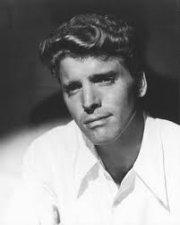
Burt Lancaster
RETURN TO INDEX |
U.S. Army

 |
American film actor noted for his athletic physique and distinctive
smile (which he called "The Grin"). Later he took roles that went
against his initial "tough guy" image. Lancaster was nominated
four times for
Academy Awards and won once for his work in
Elmer Gantry in 1960. He also won a
Golden Globe for that performance and
BAFTA Awards for
The Birdman of Alcatraz (1962) and
Atlantic City (1980). His production company,
Hecht-Hill-Lancaster, was the most successful and innovative star-driven
independent production company in Hollywood of the 1950s, making movies
such as
Marty
(1955),
Trapeze (1956), and
Sweet
Smell of Success (1957). Lancaster also directed two
films:
The
Kentuckian (1955) and
The Midnight Man (1974). In 1999, the
American
Film Institute named Lancaster nineteenth among the
greatest male stars of all time.
Served during WW2 with the
Army's Twenty-First
Special Services Division, one of the military groups organized to
follow the troops on the ground and provide
USO entertainment to keep up morale. He served with
General Mark Clark's
Fifth Army in Italy from 1943 to 1945. |
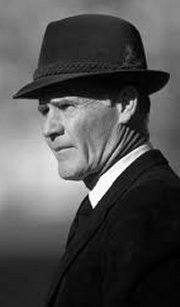
Tom Landry
RETURN TO INDEX |
U.S. Army Air Forces

 |
American football player and
coach. He is legendary for his successes as the coach of the
Dallas Cowboys.
He is ranked as one of the greatest and most innovative coaches in
National Football League (NFL) history, creating many new formations and
methods. Landry won two Super Bowl titles (VI, XII), 5 NFC titles, 13
Divisional titles, and compiled a 270-178-6 record, the 3rd most wins of
all time for an NFL coach.
Served in WW2. Landry earned his
wings and a commission as a Second Lieutenant at Lubbock Army Air Field,
and was assigned to the 493d Bombardment Group at RAF Debach, England,
as a
B-17 Flying Fortress bomber co-pilot in the 860th Bombardment
Squadron. From November 1944 to April 1945, he completed a combat
tour of 30 missions, and survived a crash landing in Belgium after his
bomber ran out of fuel. |
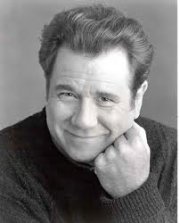
John Larroquette
RETURN TO INDEX |
U.S. Naval Reserve |
American film and television
actor. His roles include Dan Fielding on the series
Night Court, for which he won Emmy Awards in 1985, 1986, 1987, and
1988, Mike McBride in the Hallmark Channel series
McBride, John Hemingway on
The John Larroquette Show, and Carl Sack in
Boston Legal. His most memorable non-comedy role was in the
1970s NBC program
Baa Baa Black Sheep where he portrayed a WWII USMC fighter pilot 2nd
Lt. Bob Anderson. Other movies Larroquette had significant roles
in include:
Blind Date,
Stripes,
Meatballs Part II,
Summer Rental,
Star Trek III: The Search for Spock,
JFK,
and
Richie Rich.
Served before his acting career. |
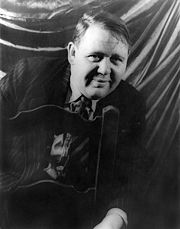
Charles Laughton
RETURN TO INDEX |
British Army

 |
English-American
stage
and film actor,
screenwriter,
producer and one-time
director. One of his most famous roles was as Lieutenant
William Bligh,
in
Mutiny on the Bounty (1935).
Served during WW1 (in which
he was
gassed) first with the 2/1st Battalion of the Huntingdonshire
Cyclist Regiment and later with the 7th Battalion of the
Northamptonshire Regiment. |
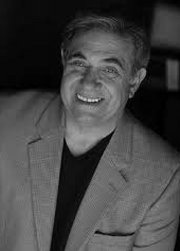
Dan Lauria
RETURN TO INDEX |
U.S. Marine Corps

 |
American television and film actor. Best known for his portrayal
of Jack Arnold, the intimidating and money conscious father on the TV
series
The Wonder Years, that ran from 1988 to 1993. He also played
James Webb in the 1998 TV miniseries
From the Earth to the Moon and as the U.S. Army Commander in 1996's
Independence Day. He also had a small role in a Season two
episode of
Army Wives, as well as a season one episode of
The Mentalist. In 2010, Lauria appears as
Vince Lombardi in the Broadway play
Lombardi.
Served in Vietnam in the early 1970s. |
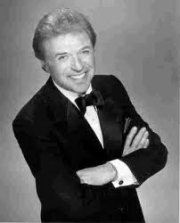
Steve Lawrence
RETURN TO INDEX |
U.S. Army |
American
singer
and
actor, perhaps best
known as a member of a
duo with his wife
Eydie Gormè, billed as
Steve and Eydie. The two have appeared together since appearing regularly on
Steve Allen's
The Tonight Show
in the mid-1950s.
Drafted in the late 1950s and
served as the official vocal soloist with
The United States Army Band "Pershing's Own" in
Washington, D.C. |
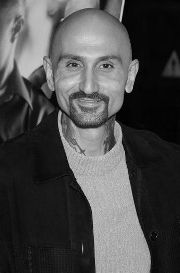
Robert LaSardo
RETURN TO INDEX |
U.S. Navy |
American actor in film and
television. He is often cast as a Latino or Latin-American
character and usually as a criminal or gang member. His films
include
The Professional (1994),
In Hell
(2003), and
Tortured (2008). He is best known for his TV roles on
General Hospital (2005-2007) and
Nip/Tuck (2003-2010).
Served four years from 1981 to 1985, two of which were spent handling
Navy attack dogs in the Aleutian Islands. The last two landed him
in places such as Africa, Australia, the Philippines, and Saudi Arabia. |
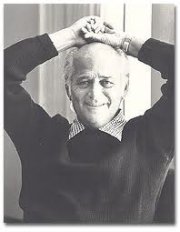
Norman Lear
RETURN TO INDEX |
U.S. Army Air Forces


 |
American
television
writer and
producer who produced such
1970s
sitcoms as
All in the
Family,
Sanford and Son,
One Day at a
Time,
The Jeffersons,
Good Times and
Maude.
Dropped out of
Emerson College
in
Boston in 1942 to
join the service. During WW2 he served in the Mediterranean
Theater as a radio operator/gunner on
Boeing
B-17 Flying Fortress bombers with the 772nd Bombardment Squadron,
463rd Bombardment Group (Heavy) of the
Fifteenth Air Force. He flew 52 combat missions, for which he
was awarded the
Air
Medal with four Oak Leaf Clusters. He was discharged from the
Army in 1945. |
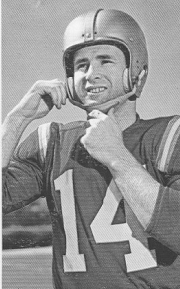
Eddie LeBaron
RETURN TO INDEX |
U.S. Marine Corps



 |
American football quarterback
in the 1950s and early 1960s in the National Football League. He
retired at the end of 1963, after playing 12 seasons, throwing for
13,399 yards and 104 touchdowns. He was selected for the Pro Bowl four
times in 1955, 1957, 1958, and 1962.
Served as a lieutenant in the Korean War. He was wounded twice and
was decorated with the Purple Heart. For his heroic actions on the front
lines, he was awarded the Bronze Star. |
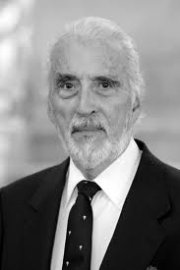
Christopher Lee
RETURN TO INDEX |
Finnish Forces
& Royal Air
Force


 |
English actor and musician.
Lee initially portrayed villains and became famous for his role as
Count Dracula
in a string of
Hammer Horror films. Other notable roles include Lord Summerisle in
The Wicker Man (1973),
Francisco
Scaramanga in
The Man with the Golden Gun (1974),
Count Dooku in
Star Wars
episodes
II and
III (2002, 2005) and
Saruman in
The Lord of the Rings film trilogy (2001 to 2003).
Volunteered to fight for the
Finnish forces during the
Winter War against
the
Soviet Union
in 1939; however, he along with other British volunteers were kept away
from actual fighting, although he was issued winter gear and was posted
on guard duty a safe distance from the frontlines. He went on to
serve in the
Royal Air Force and intelligence services during WW2, including
serving as an Intelligence officer with the
Long
Range Desert Group. He trained in South Africa as a pilot, but
eyesight problems forced him to drop out. He eventually ended up
in North Africa as Cipher Officer for
No. 260
Squadron RAF and was with it through Sicily and Italy. Lee
retired from the RAF after the end of the War with the rank of
Flight
Lieutenant. |
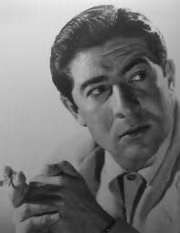
Harvey Lembeck
RETURN TO INDEX |
U.S. Army
 |
American comedic actor best
remembered for his role as Cpl. Rocco Barbella on
The Phil Silvers Show (a.k.a. Sgt. Bilko) in the late 1950s, and as
the stumbling, overconfident outlaw biker Eric Von Zipper in the beach
party movie series during the 1960s. He also turned in noteworthy
performances in both the stage and screen versions of
Stalag 17. During the late 1960s and 1970s, Lembeck became a
mainstay on television, making over 200 guest appearances, including
Ben
Casey,
The Man from U.N.C.L.E.,
Route 66,
The Monkees,
Night Gallery,
It Takes a Thief,
The Partridge Family,
Chico and the Man,
Vega$,
All in the Family, and
Mork and Mindy.
Served in WW2. |
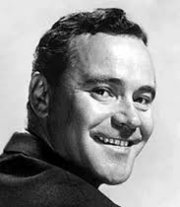
Jack Lemmon
RETURN TO INDEX |
U.S. Navy |
American
actor and
musician. He starred
in more than 60 films including
Some Like It Hot,
The Apartment,
Mister Roberts (for which he won the 1955 Best Supporting Actor
Academy Award),
Days of Wine and Roses,
The Great Race,
The Odd Couple,
Save the Tiger
(for which he won the 1973 Best Actor Academy Award),
The Out-of-Towners,
The China
Syndrome,
Missing (for which he won 'Best Actor' at the 1982 Cannes Film
Festival),
Grumpy Old Men and
Grumpier Old Men.
In the late 1940s received
V-12 training and served as an
ensign.
|
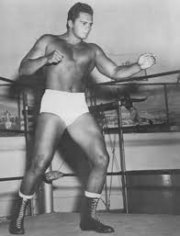
Donn Lewin
RETURN TO INDEX |
U.S. Marine Corps


 |
American professional
wrestler. While competing for Capitol Wrestling in Maryland, he
teamed with his real-life brother Mark Lewin to win the American Tag
Team Championship. In Georgia, he teamed with his brother Mark
again to win the Georgia version of the NWA International Tag Team
Championship. a promoter asked Lewin to begin wearing a mask and
competing as The Executioner. He used the identity while competing in
several promotions. During that time period, Lewin also helped train
Greg Valentine as a professional wrestler.
Served in WW2. Left school at age 15 to the service. He
fought at Iwo Jima, Guadalcanal, and Guam, and left the marines after
attaining the rank of admiral's orderly. During his time in the
service, he earned three Purple Hearts for wounds suffered in battle. |
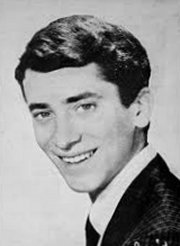
Gary Lewis
RETURN TO INDEX |
U.S. Army

 |
American musician who was
the leader of
Gary
Lewis & the Playboys. His number one hit "This Diamond Ring",
was on Billboard magazine's Hot 100 chart on February 20, 1965, made
Lewis an instant star. Lewis was Cash Box magazine's 1965 "Male
Vocalist of the Year." Besides the Lovin' Spoonful, he was the
only artist during the 1960s to have his first seven releases each reach
the Top 10 of the Hot 100. His other hits include "Count Me In"
(the only non-British Commonwealth record in Hot 100's Top 10 on 8 May
1965, at #2), "She's Just My Style", and "Everybody Loves a Clown".
Drafted in January 1967 he served in Vietnam until 1968. |
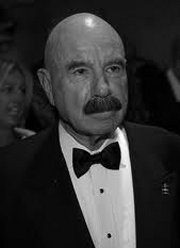
G. Gordon Liddy
RETURN TO INDEX |
U.S. Army
 |
American radio talk show
host. His radio show as of 2009 is syndicated in 160 markets by
Radio America and on both Sirius Satellite Radio and XM Satellite Radio
stations in the U.S. He has also been a guest panelist for Fox
News Channel in addition to appearing in a cameo role or as a guest
celebrity talent in several television shows. He was the chief
operative for the White House Plumbers unit that existed from
July-September 1971, during Richard Nixon's presidency.
Separately, along with E. Howard Hunt, Liddy also organized and directed
the
Watergate burglaries of the Democratic National Committee
headquarters in the Watergate building in May and June of 1972.
After five of Liddy's operatives were arrested inside the DNC offices on
June 17, 1972, subsequent investigations of the Watergate scandal led to
President's Nixon's resignation in August 1974. Liddy served
nearly fifty-two months in federal prisons for his conviction of various
crimes related to the Plumbers and/or the Watergate affair.
Served during the Korean War. Served for two years as an artillery
officer. He remained stateside for medical reasons. |
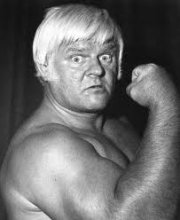
Reginald
Lisowski
RETURN TO INDEX
|
U.S. Army

 |
American professional
wrestler, better known by his ring name, The Crusher whose haydays were
in the 1950s and 1960s, officially retiring in 1981. Promoted as
"The Wrestler Who Made Milwaukee Famous," he'd brag about running along
the Lake Michigan waterfront with a keg of beer on each shoulder so he
could get in shape to polka all night with the town's many Polish
barmaids. Until early 1965, Crusher was a heel (hated bad guy) in
the AWA. After meeting the legendary team of Larry Hennig & Harley Race
for the first time, the fans adopted Crusher and his wrestling "cousin"
Dick the Bruiser as full fledged heroes in AWA territory. Crusher was
successful as a solo wrestler, winning the AWA World Heavyweight
Championship three times.
Served in WW2 and took up wrestling while stationed in Germany in
1945 to 1946. |
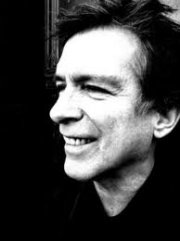
Kurt Loder
RETURN TO INDEX |
U.S. Army
 |
American film critic, author,
columnist, and television personality. He served in the 1980s as
editor at
Rolling Stone, during a tenure that Reason later called "legendary".
He has contributed to articles in
Reason,
Esquire,
Details,
New York, and
Time. He has also made cameos on several films and television
series. Prior to Rolling Stone, Loder had worked for
Circus magazine. He is currently best known for his role at
MTV News and for appearing in numerous other MTV-related television
specials.
Drafted in the mid-1960s and joined the Army's 4-week journalism school.
He was stationed in Germany and served 3 years. |
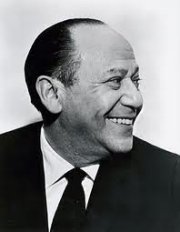
Frank Loesser
RETURN TO INDEX |
U.S. Army Air Forces
 |
American songwriter who wrote
the lyrics and scores to the hits
Guys and Dolls and
How To Succeed In Business Without Really Trying, among others.
He won separate Tony Awards for the music and lyrics in both shows, as
well as sharing the Pulitzer Prize for Drama for the latter. He
also wrote numerous songs for films and
Tin Pan Alley, many of which have become standards, and was
nominated for five Academy Awards for best song, winning once, for
Baby, It's Cold Outside.
Served in WW2. Enlisted as a song writer, Loesser wrote the
popular war songs
Praise the Lord and Pass the Ammunition (1942) and
The Ballad of Rodger Young (1943), among others. In 1944,
Loesser worked on a little known musical intended to be performed by and
for US soldiers abroad, titled Hi Yank!, the music for which was
composed by Alex North. Hi Yank! was produced by the U.S. Army
Office of Special Services as a "blueprint special" to boost the morale
of soldiers located where USO shows could not visit. |
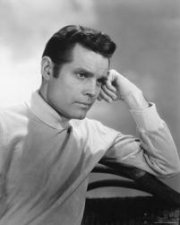
Jack Lord
RETURN TO INDEX |
U.S. Army
& Merchant Marine

 |
American television, film, and Broadway actor. He was known for his
starring role as
Steve McGarrett in the American television program
Hawaii Five-O from 1968 to 1980. Lord appeared in feature films earlier in his career,
among them
Man of the West (1958). He was the first actor to play recurring
character
Felix Leiter in the first James Bond film
Dr. No.
Spent the first year of WW2 with the U.S. Army's Corps of Engineers, building bridges in
Persia. He returned to the Merchant Marine as an
Able Seaman before enrolling in the deck officer course at Fort
Trumbull. |
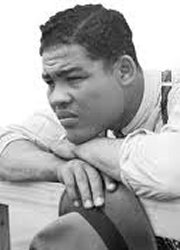
Joe Louis
RETURN TO INDEX |
U.S. Army
 |
American world heavyweight
boxing champion from 1937 to 1949. He is considered to be one of
the greatest heavyweights of all time. Nicknamed the Brown
Bomber, Louis helped elevate boxing from a nadir in popularity in the
post-Jack Dempsey era by establishing a reputation as an honest,
hardworking fighter at a time when the sport was dominated by gambling
interests. Louis's championship reign lasted 140 consecutive
months, during which he participated in 27 championship fights, 26
championship fights during his reign; the 27th, against Ezzard Charles,
was a challenge to Charles' heavyweight title and so is not included in
Louis' reign. All in all, Joe was victorious in 25 successful
title defenses, a record for the heavyweight division. In 2005,
Louis was named the greatest heavyweight of all time by the
International Boxing Research Organization, and was ranked number one on
The Ring's list of 100 Greatest Punchers of All Time.
Volunteered to enlist as a private in January 1942 at Camp Upton, Long
Island. For basic training, Louis was assigned to a segregated
cavalry unit based in Fort Riley, Kansas. Louis used this personal
connection to help the cause of various black soldiers with whom he came
in to contact. Realizing Louis's potential for elevating esprit de
corps among the troops, the Army placed him in its Special Services
Division rather than deploying him into combat. Louis would go on
a celebrity tour with other notables including fellow boxer Sugar Ray
Robinson. Louis traveled more than 21,000 miles and staged
96 boxing exhibitions before two million soldiers. |
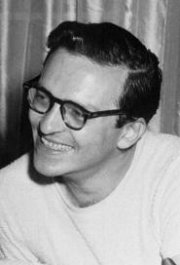
Sidney Lumet
RETURN TO INDEX |
U.S. Army

 |
American director, producer and screenwriter with over 50 films to his name. He
was nominated for the
Academy Award as
Best Director for
12 Angry Men (1957),
Dog Day Afternoon
(1975),
Network (1976) and
The Verdict (1982).
He did not win an individual Academy Award, although he did receive an
Academy Honorary
Award and 14 of his films were nominated for various Oscars, such as
Network, which was nominated for 10, winning 4. The Encyclopedia of Hollywood states that Lumet was one of the most
prolific directors of the modern era, making more than one movie per year on
average since his directorial debut in 1957.
Served in WW2 (1942 to 1946) as a radar repairman stationed in India and
Burma. |
|

